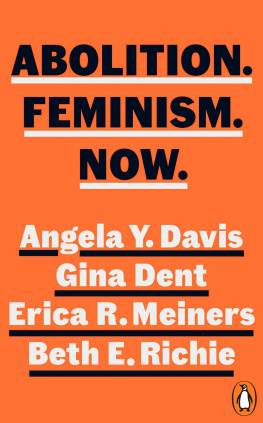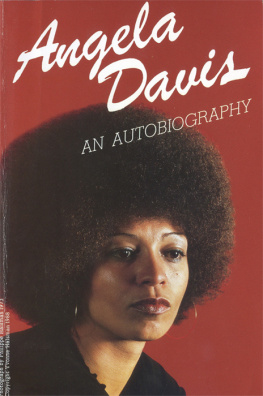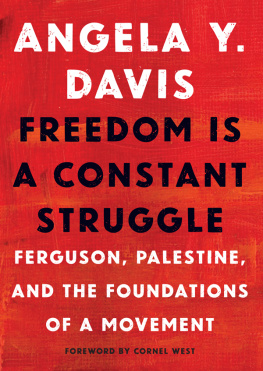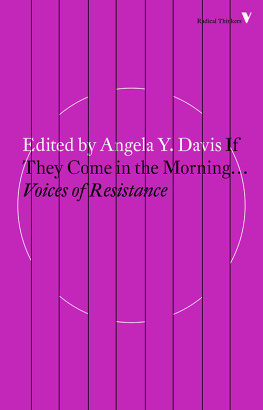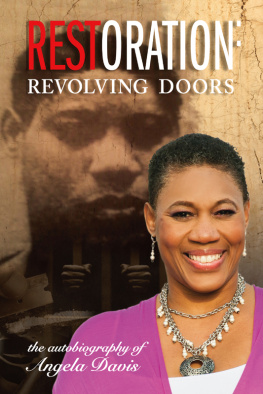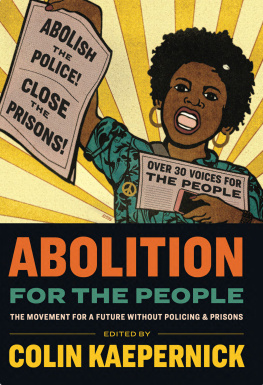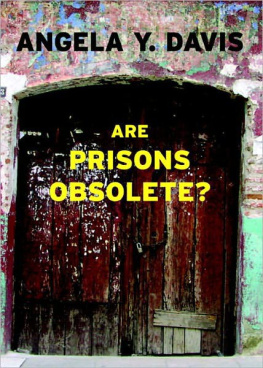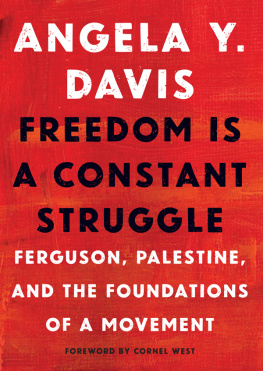Angela Y. Davis - Abolition. Feminism. Now.
Here you can read online Angela Y. Davis - Abolition. Feminism. Now. full text of the book (entire story) in english for free. Download pdf and epub, get meaning, cover and reviews about this ebook. year: 2022, publisher: Penguin Books Ltd, genre: Politics. Description of the work, (preface) as well as reviews are available. Best literature library LitArk.com created for fans of good reading and offers a wide selection of genres:
Romance novel
Science fiction
Adventure
Detective
Science
History
Home and family
Prose
Art
Politics
Computer
Non-fiction
Religion
Business
Children
Humor
Choose a favorite category and find really read worthwhile books. Enjoy immersion in the world of imagination, feel the emotions of the characters or learn something new for yourself, make an fascinating discovery.
- Book:Abolition. Feminism. Now.
- Author:
- Publisher:Penguin Books Ltd
- Genre:
- Year:2022
- Rating:4 / 5
- Favourites:Add to favourites
- Your mark:
- 80
- 1
- 2
- 3
- 4
- 5
Abolition. Feminism. Now.: summary, description and annotation
We offer to read an annotation, description, summary or preface (depends on what the author of the book "Abolition. Feminism. Now." wrote himself). If you haven't found the necessary information about the book — write in the comments, we will try to find it.
Abolition. Feminism. Now. — read online for free the complete book (whole text) full work
Below is the text of the book, divided by pages. System saving the place of the last page read, allows you to conveniently read the book "Abolition. Feminism. Now." online for free, without having to search again every time where you left off. Put a bookmark, and you can go to the page where you finished reading at any time.
Font size:
Interval:
Bookmark:

Erica R. Meiners, and Beth E. Richie

This book has been written by four activist-scholars, with unique collective experience in the social movements which led to and combine within abolitionist feminism:
Angela Y. Davis is a political activist, author and speaker. She is an outspoken advocate for the oppressed and exploited, writing on Black liberation, prison abolition and the intersections of race, gender and class. She is the author of many books, from Angela Davis: An Autobiography to Freedom is a Constant Struggle.
Gina Dent writes and teaches on race, feminism, popular culture and visual art as Associate Professor of Feminist Studies, History of Consciousness and Legal Studies at the University of California, Santa Cruz.
Erica R. Meiners is Professor of Education and Womens and Gender Studies at Northeastern Illinois University. She is the author of several books including Right to be Hostile: Schools, Prisons and the Making of Public Enemies.
Beth Richie is Professor of African American Studies, Sociology, Gender and Womens Studies, and Criminology, Law and Justice at the University of Illinois at Chicago. Her most recent book is Arrested Justice: Black Women, Violence and Americas Prison Nation.
In this powerful, wise, and well-crafted book, filled with insight and provocation, Angela Y. Davis, Gina Dent, Erica R. Meiners, and Beth E. Richie make it patently and abundantly clear why abolitionist feminism is necessary. Offering vivid snapshots from a political movement, the book explains how organizing to end violence, without turning to violent institutions such as prisons and the police as remedies, is how we learn what we need to do to make change possible [The authors] teach us, in taking up the slow, practical, and painstaking work of campaigning, to expand our political horizons and create imaginative tools for world-building This book is as capacious and demanding as the abolitionist feminism it calls for. It gives us a name for what we want. Abolitionism. Now.
Sara Ahmed, author of Living a Feminist Life
This extraordinary book makes the most compelling case Ive ever seen for the indivisibility of feminism and abolition, for the inseparability of gendered and state violence, domestic policing and militarism, the street, the home, and the world. Combining decades of analytical brilliance and organizational experience, Davis, Dent, Meiners, and Richie offer a genealogy of the movements that brought us here, lessons learned, battles won and lost, and the ongoing collective struggle to build a thoroughly revolutionary vision and practice. A provocation, an incitement, an offering, an invitation to a difficult struggle to which we must all commit. Now.
Robin D. G. Kelley, author of Freedom Dreams:
The Black Radical Imagination
In Abolition. Feminism. Now., Angela Y. Davis, Gina Dent, Erica R. Meiners, and Beth E. Richie brilliantly show how abolition feminism has always offered the radical tools we need for revolutionary change. [They] reveal the connections between state violence and intimate violence, between prisons and family policing, and between local and global organizing, [and] compel us to see the urgent necessity of abolition feminism now.
Dorothy Roberts, author of Torn Apart: How the Child
Welfare System Destroys Black Familiesand How
Abolition Can Build a Safer World
This little book is a massive offering on where we have been, where we are right now, and what we are imagining and organizing into being as abolition feminists Invigorating and rooting, [it] is instantly required reading, showing us how everything we have done and are doing is accumulating towards a post-punitive, transformative future This book is a lineage of words and visuals, showing us the beauty of our efforts, and gently reminding us that we are not failingwe are learning, and we are changing.
adrienne maree brown, author of Emergent Strategy:
Shaping Change, Changing Worlds
In 2001, a cluster of people attached to two emerging organizations connected to burgeoning movements gathered in a stuffy room over a weekend to hash out more than a statement. A key instigator for the small conveningprimarily of women of colorwas a pressing question: how to continue to knit together campaigns and analyses focused both on building a world without prisons and policing and building a world free of gender and sexual violence. INCITE! Women of Color Against Violence was a growing network challenging the mainstream/whitestream anti-violence movements reliance on policing and punishment, and Critical Resistance had recently coalesced into an organization of abolitionists campaigning for the end of policing and prisons. While both were new and developing networks with many overlapping people and shared analyses, these two groups recognized the value of articulating a collective vision and the importance of writing and circulating a statement on the difficult intersection of their shared work. They understood that crafting a joint statement that balanced an attention to both interpersonal and state violence represented not only an engagement with the thorniest subjects for both organizations but also an opportunity for public engagement in the production of shared analytics, campaign demands, and radical visions.
Members of the two newly formed groups spent an intense weekend at Mills College in Oakland, California, hammering out the INCITE!-Critical Resistance Statement on Gender Violence and the Prison Industrial Complex, which clearly named the vision and the challenge. The statement reads in part:
It is critical that we develop responses to gender violence that do not depend on a sexist, racist, classist, and homophobic criminal justice system. It is also important that we develop strategies that challenge the criminal justice system and that also provide safety for survivors of sexual and domestic violence.
Outlining how radical freedom, mutual accountability, and passionate reciprocity can build toward the survival and care of all peoples, this eleven-point statement identified at its core precisely why abolition must be feminist and why feminism must be abolitionist. Like most collaborative political work, the INCITE!-Critical Resistance Statement arrived in 2001 long past its due date and initially landed quietly. Originally published both as a poster and a manifesto, the statement circulated in feminist and abolitionist movement spaces, propelled by the clarity and compelling nature of its demands and the growing cadre of organizers with whom the statement resonated. As a key reference point in the history of abolition feminism, the document is heralded as an exemplary and clarion call for a more complex approach to anti-police and anti-prison movements, as well as an insistence on antiracism and anticapitalism as central dimensions of contemporary feminism.
In 2021, we return to this statement and its interventions at a critical moment for the future of social justice, as contemporary organizing makes abolition increasingly irresistible both as a mode of analysis and a political practice. Inching from the margins toward the mainstream, from the end of course syllabi to the beginning, calls for abolition proliferate.
Next pageFont size:
Interval:
Bookmark:
Similar books «Abolition. Feminism. Now.»
Look at similar books to Abolition. Feminism. Now.. We have selected literature similar in name and meaning in the hope of providing readers with more options to find new, interesting, not yet read works.
Discussion, reviews of the book Abolition. Feminism. Now. and just readers' own opinions. Leave your comments, write what you think about the work, its meaning or the main characters. Specify what exactly you liked and what you didn't like, and why you think so.

